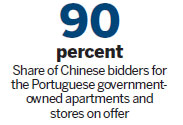
As bargain-hunters waited in a packed room at a property auction in Lisbon last month, one language dominated their chat: Mandarin.
About 90 percent of the bidders for the government-owned apartments and stores on offer were Chinese, according to Jorge Oliveira, the official overseeing the asset sale. They ended up acquiring more than two-thirds of the 45 properties, he said.
"A Portuguese investor bought a store to start a bakery and coffee shop, but most of the properties went to the Chinese," Oliveira said after the sale.
Portugal is the latest target for Chinese investors who have been acquiring buildings around the world as China allows freer movement of funds in and out of the country. The Chinese accounted for almost one in five foreign property purchases in Portugal during the first nine months of this year, according to the Lisbon-based Portuguese Real Estate Professionals and Brokers Association.
Bing Wong, a 52-year-old store-owner from Shanghai who attended the Oct 24 auction, has been buying properties in Lisbon to create a network of outlets to serve the biggest concentration of Chinese residents in Portugal.
 |
| Portugal raises 1.6 b euros through sale of biggest insurance group |
 |
| Fosun chosen to buy Portugal's insurer |
"Lisbon is cheap if you compare it with other cities," he said. "The economy is improving and there are some good deals to be done here."
Shops on London's Bond Street are about 25 times more expensive than the equivalent on Lisbon's downtown shopping areas of Chiado or Avenida da Liberdade, according to Darren Yates, head of global capital markets research at Knight Frank in London. Rents on Bond Street are about 10,000 euros ($12,600) a square meter, about 10 times more than the cost of renting prime retail space in Lisbon, Yates said.
Spending on commercial properties in Portugal will rise to as much as 800 million euros this year from 322 million euros in 2013, according to broker Cushman & Wakefield Inc.
Portugal is slowly emerging from three years of austerity after completing a three-year bailout program in May. The capital is leading the way as a tourism boom provides the money - and an added incentive - to renovate whole blocks of buildings that have fallen into disrepair.
For buyers from outside the European Union, there is also the prospect of a visa. Chinese investors are the top beneficiaries of Portugal's property-for-visa program, which enables buyers of property worth 500,000 euros or more to live in Portugal and travel freely within the EU.
Chinese policymakers have made it easier for investors to transfer money into and out of the country as they try to boost the global stature of the yuan.
While wealthy Chinese have for years been picking up expensive real estate in markets including New York, London, Sydney and Vancouver, the new measures have encouraged individual investors and their families to purchase properties in markets such as Portugal, where there's less competition for assets.
Lisbon city council and State-owned companies are selling apartments, ground-floor retail space and even entire buildings in prime locations to raise money to repay their debts.
Oliveira works for one of these companies, urban developer EPUL, and is responsible for organizing asset sales such as last month's auction. EPUL is due to be wound down at the end of the year after the city council decided in 2012 to liquidate the debt-laden company.
The properties sold at the auction were in five buildings along one side of Praca Martim Moniz in downtown Lisbon. The square is best known for being the starting point for the vintage No 28 trams that take tourists along the narrow, cobbled streets of Alfama, Lisbon's oldest district, to attractions including Saint George's hilltop castle and the Feira da Ladra, or Thieves Market.
These days, there is another reason to visit Martim Moniz and the nearby Almirante Reis Avenue: the rows of Chinese restaurants, clothing shops and grocery stores selling lemon grass and black soy sauce that have opened over the past three years.
"With so many Chinese investing in Lisbon, I'm sure there will soon be a Chinatown in the city," said Yi Li, a 51-year-old businessman from Shanghai.
